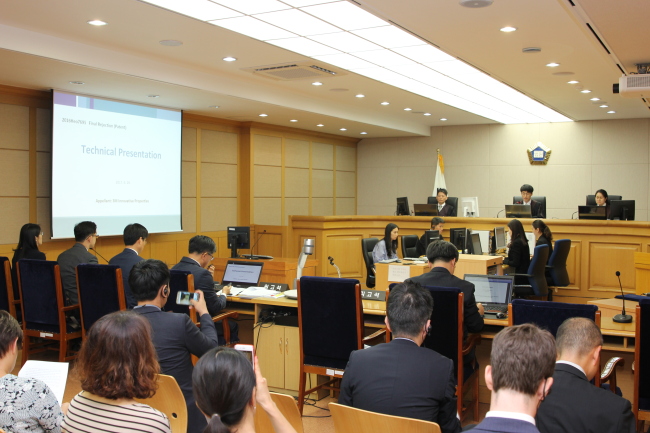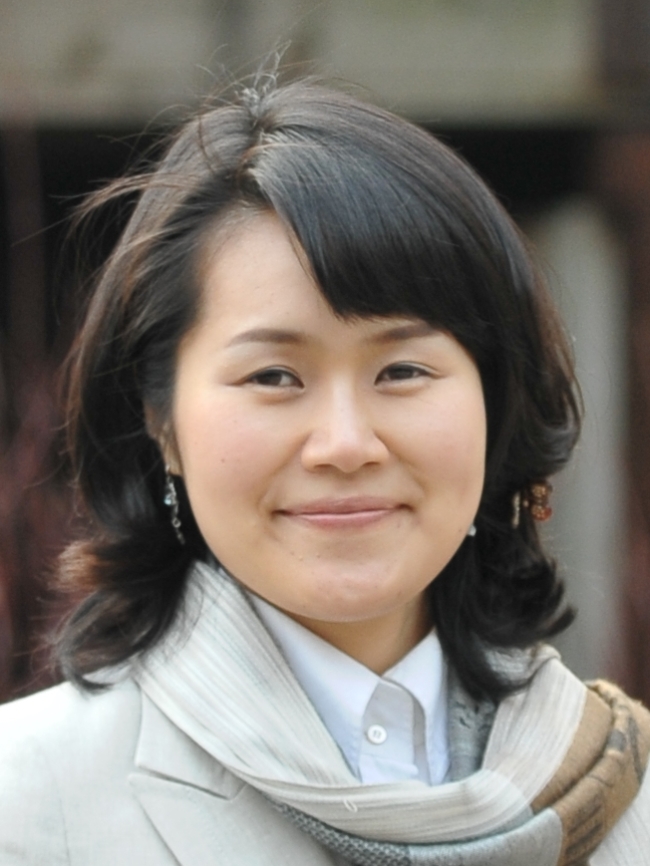Patent Court completes first-ever English test hearing
By Julie Kim JacksonPublished : June 29, 2017 - 16:29
DAEJEON -- In an effort to appease a growing number of foreign parties and international patent cases tried in the country, the Patent Court of Korea on Wednesday held a test trial of an International Chamber case hearing adjudicated in English.
According to the Patent Court, located in Daejeon, the demand for English-language trials has been repeatedly raised by international parties, who accounted for more than 40 percent of the 611 cases adjudicated by the court last year.
The test trial, “3M Innovative Properties Company v. Commissioner of Korea Intellectual Property Office,” was an opportunity to analyze the pros and cons of instituting the International Chamber.
Amid growing ambitions for Korea to prove itself as a leading nation in global intellectual property by becoming a global hub for patent litigation, the Patent Court has been calling for the establishment of an International Chamber that provides an opportunity for parties to argue cases in English and help formulate operation and procedural models.
According to the Patent Court, located in Daejeon, the demand for English-language trials has been repeatedly raised by international parties, who accounted for more than 40 percent of the 611 cases adjudicated by the court last year.
The test trial, “3M Innovative Properties Company v. Commissioner of Korea Intellectual Property Office,” was an opportunity to analyze the pros and cons of instituting the International Chamber.
Amid growing ambitions for Korea to prove itself as a leading nation in global intellectual property by becoming a global hub for patent litigation, the Patent Court has been calling for the establishment of an International Chamber that provides an opportunity for parties to argue cases in English and help formulate operation and procedural models.

In a setting not too different from an ordinary hearing, oral arguments for the case were given in English by attorneys from Kim & Chang representing the plaintiffs, the defendant and the commissioner of the Korean Intellectual Property Office, while members of the bench deliberated and presided over the case speaking in Korean. The judges then followed their deliberations with English translations.
For those who attended the public trial, simultaneous interpretation in English and Korean was provided via headsets throughout the case.
“We had 209 cases in 2015 where the parties were foreigners, but in 2016 we had over 300 cases; so there is a special need to give foreigners easier accessibility in Korea,” said Patent Court Judge Chang Hyun-jin, one of the presiding judges for the inaugural English hearing, during an interview with The Korea Herald following the court case.
“Like the Apple/Samsung case, multinational companies do not always file lawsuits in only one country because they have businesses all around the world,” said Chang. “So judiciaries, like in Korea, feel the need to improve their judiciary system in IP litigation and allow better (information) accessibility for litigants.”

A bill to amend the Court Organization Act to establish the International Chamber, which was proposed by Rep. Jeong Kab-yoon, is currently pending at the National Assembly.
In preparation for the Assembly’s decision, the Patent Court has been publishing court decisions and IP law journals in English as well as providing court practice and procedure guidelines in English, Chinese and Japanese since 2015.
However, should the establishment of an International Chamber be approved by the Assembly, the Chamber does not mean international attorneys will be permitted to argue litigation matters, according to Chang. In accordance with Korean law, only locally licensed and approved attorneys will have permission to try cases.
Although all parties of a trial -- presiding judges, plaintiffs and defendants -- will most likely be Korean, Judge Chang said the need for an English court is necessary as a supplementary tool for the purpose of better communication and information accessibility on an international level, given that all evidence and documentation for a hearing will be submitted in English.
“One of our efforts is to enhance accessibility for foreigners,” said Chang. “When I think about the UK court ... they have only one-tenth of the cases that we have. But the UK cases, we can easily find their court decisions and their patent litigation news on Google. I think this is because it is all written in English.”
As for the potential legal ramifications for parties who may appeal on grounds of miscommunication or mistranslation, the judge says that verbal miscues occur even when speaking in Korean.
“Communication misunderstandings happen every day, no matter the language,” she says. “In patent litigation, it can actually be easier for a judge or parties to use the English language, because these days, most patent applications are written in English first.”
The test patent trial was attended by various members of Korea’s international business community including the Japan Chamber of Commerce as well as IP representatives of Apple, Chanel, Hermes and Louis Vuitton. The local business leaders are scheduled to participate in a seminar to exchange comments and criticism on the first hearing.
Sven-Erik Batenburg, head of legal and international affairs with the European Chamber of Commerce in Korea, was also in attendance.
“As a whole, the possibility of having cases conducted in another language, shows the trend of an international mindset,” said Batenburg.
“The (EU-Korea) FTA will be in place six years next month, meaning that companies have already been coming and doing business in Korea,” he added. “And when you do business in any country, there will be conflicts ... but stopping the language barrier will help facilitate litigations.”
By Julie Jackson (juliejackson@heraldcorp.com)









![[Today’s K-pop] BTS pop-up event to come to Seoul](http://res.heraldm.com/phpwas/restmb_idxmake.php?idx=644&simg=/content/image/2024/04/17/20240417050734_0.jpg&u=)

![[Graphic News] More Koreans say they plan long-distance trips this year](http://res.heraldm.com/phpwas/restmb_idxmake.php?idx=644&simg=/content/image/2024/04/17/20240417050828_0.gif&u=)





![[KH Explains] Hyundai's full hybrid edge to pay off amid slow transition to pure EVs](http://res.heraldm.com/phpwas/restmb_idxmake.php?idx=652&simg=/content/image/2024/04/18/20240418050645_0.jpg&u=20240419100350)

